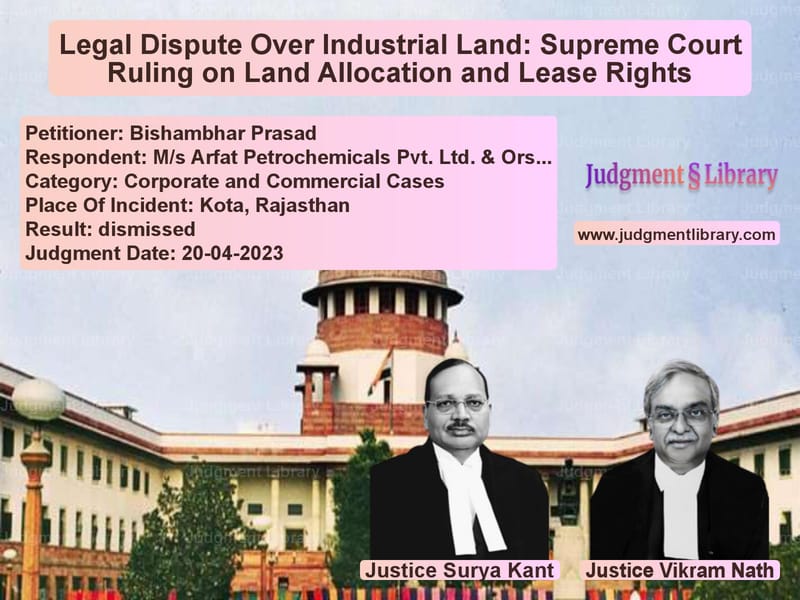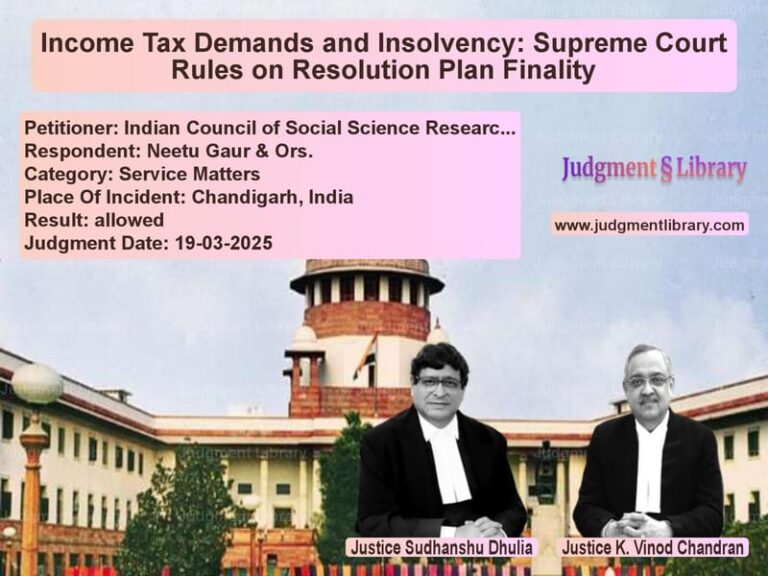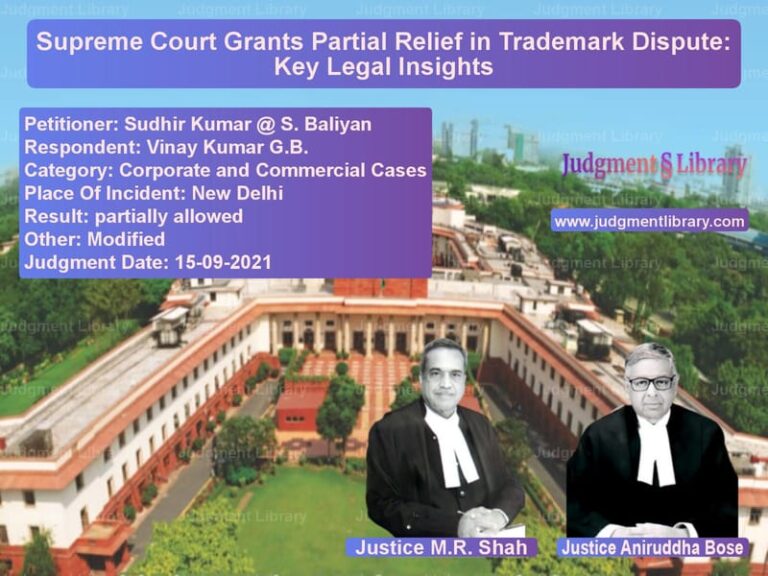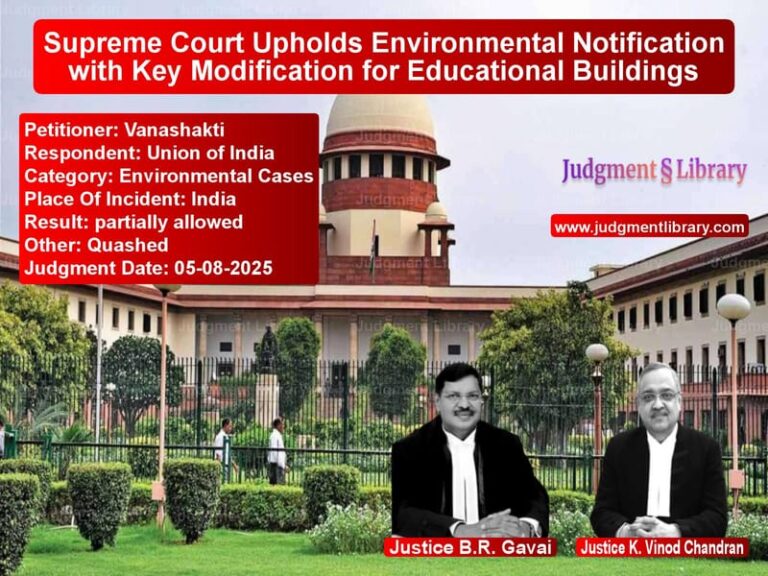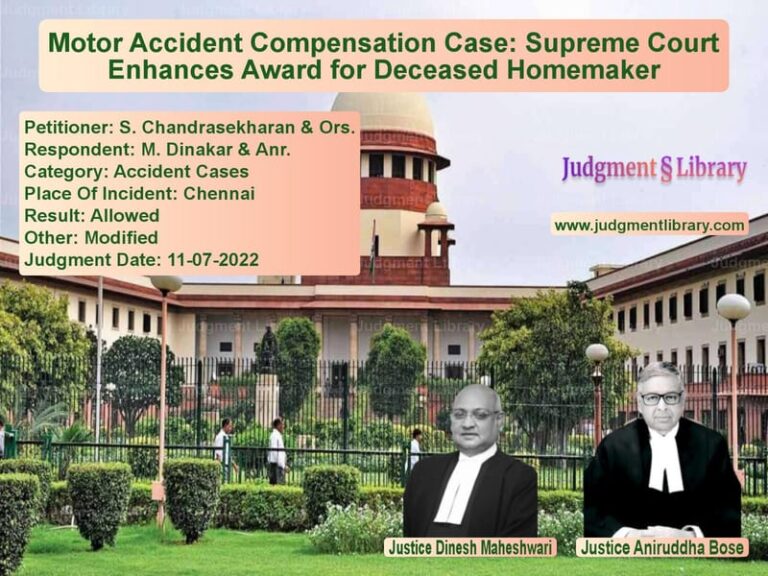Legal Dispute Over Industrial Land: Supreme Court Ruling on Land Allocation and Lease Rights
The Supreme Court of India recently delivered a significant judgment in the case of Bishambhar Prasad vs. M/s Arfat Petrochemicals Pvt. Ltd. & Ors., along with related appeals. The case revolves around a long-standing dispute over industrial land in Kota, Rajasthan, originally leased to J.K. Synthetics Ltd. (JKSL) and later transferred to M/s Arfat Petrochemicals Pvt. Ltd. (Respondent No. 1). The key issue was whether the Rajasthan Industrial Development and Investment Corporation Ltd. (RIICO) had the authority to permit conversion of land use and execute supplementary lease deeds in favor of Respondent No. 1.
Background of the Dispute
The dispute began when JKSL was allotted approximately 271.39 acres of land in Kota’s Large-Scale Industrial Area (LIA) in 1958. The lease was executed under the Rajasthan Industrial Areas Allotment Rules, 1959, which governed land allocation for industrial use. Over time, JKSL continued operations, renewing lease agreements as per the prescribed rules.
However, in the 1990s, JKSL faced financial difficulties and was declared a ‘sick company’ under the Sick Industrial Companies (Special Provisions) Act, 1985 (SICA). To revive its operations, JKSL entered into a memorandum of understanding (MoU) with Respondent No. 1. Subsequently, the Board for Industrial and Financial Reconstruction (BIFR) approved a rehabilitation scheme, transferring leasehold rights of 227.15 acres of industrial land to Respondent No. 1.
Actions Taken by RIICO
Following the transfer, Respondent No. 1 attempted to change the land use from industrial to commercial. Initially, the request for change of land use under the Chief Minister Jan Aavas Yojana was unsuccessful. Later, Respondent No. 1 sought approval from RIICO, which granted permission for conversion of 23% of the land and subdivision of plots.
However, after a change in the Rajasthan state government in 2018, the new administration reviewed prior approvals and found irregularities in RIICO’s decisions. The Cabinet Committee resolved to cancel all permissions granted to Respondent No. 1, including the supplementary lease agreements and the approval for land conversion.
Legal Arguments
Arguments by the State of Rajasthan and RIICO
- The land in LIA, Kota, was always under the ownership of the State Government, and RIICO had no authority to permit conversion.
- The lease agreements executed with Respondent No. 1 were governed under the 1959 Rules, making the State Government the only competent authority for land use decisions.
- Rule 8 of the 1959 Rules mandated that land allotted for industrial purposes could not be used for commercial activities without explicit State Government approval.
- RIICO’s permissions were unauthorized and in violation of legal provisions, necessitating cancellation.
Arguments by Respondent No. 1
- RIICO had acted within its authority under the RIICO Disposal of Land Rules, 1979, which allowed for land conversion and sub-division.
- The government’s decision to cancel approvals was arbitrary and politically motivated.
- Respondent No. 1 had made significant investments in the land and acted based on legitimate expectations.
- The cancellation of approvals without issuing a show cause notice violated principles of natural justice.
Supreme Court’s Verdict
The Supreme Court ruled in favor of the State of Rajasthan, holding that:
- The land in LIA, Kota, remained under the control of the State Government, and RIICO had no authority to grant land conversion approvals.
- RIICO’s 1979 Rules were not statutory and could not override the 1959 Rules, which governed industrial land allocations.
- The approval granted by RIICO to Respondent No. 1 was unauthorized, and the State Government had the right to annul such decisions.
- The doctrine of legitimate expectations could not be applied to validate an illegal decision.
- There was no violation of natural justice, as the cancellation merely corrected an illegal act.
Conclusion
The Supreme Court’s ruling underscores the importance of adhering to legal procedures in land allocations and lease agreements. The decision clarifies that industrial land cannot be repurposed for commercial use without State Government approval. Furthermore, the case highlights the role of governance in ensuring that public resources are used for their intended purposes, preventing unauthorized modifications for private gain.
Petitioner Name: Bishambhar Prasad.Respondent Name: M/s Arfat Petrochemicals Pvt. Ltd. & Ors..Judgment By: Justice Surya Kant, Justice Vikram Nath.Place Of Incident: Kota, Rajasthan.Judgment Date: 20-04-2023.
Don’t miss out on the full details! Download the complete judgment in PDF format below and gain valuable insights instantly!
Download Judgment: bishambhar-prasad-vs-ms-arfat-petrochemi-supreme-court-of-india-judgment-dated-20-04-2023.pdf
Directly Download Judgment: Directly download this Judgment
See all petitions in Company Law
See all petitions in Landlord-Tenant Disputes
See all petitions in Corporate Governance
See all petitions in unfair trade practices
See all petitions in Judgment by Surya Kant
See all petitions in Judgment by Vikram Nath
See all petitions in dismissed
See all petitions in supreme court of India judgments April 2023
See all petitions in 2023 judgments
See all posts in Corporate and Commercial Cases Category
See all allowed petitions in Corporate and Commercial Cases Category
See all Dismissed petitions in Corporate and Commercial Cases Category
See all partially allowed petitions in Corporate and Commercial Cases Category

